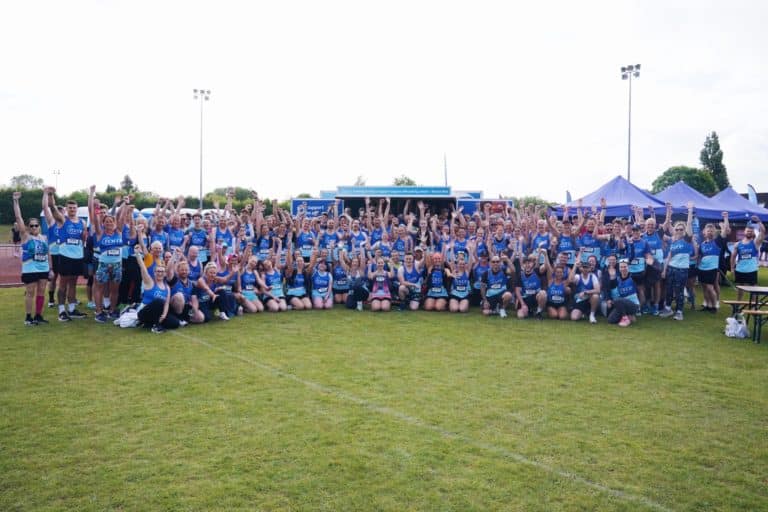
Well done Team FORCE at the Great West Run
Congratulations to every member of Team FORCE who took to the streets of Exeter for the 2025 Great West Run.…
FORCE’s Moving Forward Programme is designed to help patients who have finished treatment within the last year.
The free, five-week course is designed to help people adjust to life after treatment – a time when fewer appointments and less regular contact with the hospital can feel like a safety net has been removed.
The sessions are led by an oncology support specialist, an oncology information nurse or a specially trained professional volunteer.
The time beyond treatment can be difficult. People often feel pressure from family and friends to ‘get back to normal’ but they still may be reeling from the physical, emotional and practical demands of treatment.
The Moving Forward Programme is designed to help people deal with some of those demands and pressures and to help support them through a time of adjustment.
A diagnosis of cancer can create a ripple effect through people’s lives. The course has been created with some of the common themes which recur for people coming to the end of their treatment.
Each group will be limited to 10 people with each of them asked for a commitment to attend five sessions.
Talking about shared experiences is a really important part of this programme.
Having an opportunity to express your feelings among others who have a unique understanding can be a part of the healing, which starts to happen after treatment.
At the end of the five weeks we hope everyone will have identified what they need to prioritise for themselves and how best they can move forward.
The programme has been created after considering feedback from a patient survey and a team of experienced professionals, working alongside patients and their families. These include nurses, oncology support specialists and an oncology physiotherapist.
Each session offers a psychologically supportive environment allowing for discussion, support and information. There will also be guidance on managing anxiety with relaxation techniques – a natural antidote to stress.
To reserve your place please contact Emma Ellis.
What’s in the Moving Forward Programme
The first session will explore the ripple effects of cancer and its treatments. While recognising the general impact a diagnosis of cancer can have, each group member will have individual needs and experiences. The session will be tailored to help people manage and regain confidence for themselves.
This session will look at the physical effects of a diagnosis and treatment. We know that a significant number of people will experience fatigue to some degree and that how we feel emotionally can be linked to how active we are. This week looks at how we can reduce fatigue and keep active, combined with guidance about eating well.
The focus will be on recognising that fear of the future is natural and often more intense at certain times. This session will allow space to recognise the triggers and offer strategies on how these might be managed.
A diagnosis of cancer can naturally put pressure on relationships, which in turn can affect communication. This session helps to reflect on how relationships may have been impacted and how good communication can help in restoring balance.
The course aims to identify each person’s needs, offer them a chance to prioritise, notice and accept change and gather the resources needed so that by the end they have a new understanding about how life may be moving forward.
“Imagine a roller-coaster – I have chosen this image to represent the process of the diagnosis and treatment of cancer.
On a rollercoaster, you will be strapped in and sent off into the terror, knowing that there is nothing you can do about it until you emerge, wobbly and battered at the other end.
You manage by getting your head down and dealing with it as best you can at the time.
It is only afterwards, when you are on solid ground again, that you can look back with amazement and view what you have experienced and marvel at your courage.
This seems to be an analogy for what happens after diagnosis and during treatment.
The end of the ride is equivalent to the end of treatment – at the point where you can begin, bit by bit, to deal with all that you have been through and all that is to come.
You may have had to endure months of treatment by knife, chemicals or radiation until you are probably sick of the whole business, both literally and metaphorically.
Now is the time to heal, both body and mind.”
Dr Peter Harvey – Consultant Clinical Psychologist
Maggie Stephenson was diagnosed with breast cancer two days before her wedding in May 2017.
Biopsies and scans confirmed an aggressive grade 3 tumour and immediately after their honeymoon she was admitted for a mastectomy with immediate reconstruction followed by chemotherapy, radiotherapy and hormone therapy.
FORCE has supported Maggie and her husband, including counselling sessions that she describes as “a lifeline.”
She was told about the Moving Forward Programme as a way of helping come to terms with the end of active cancer treatment and facing the future without the safety net of frequent hospital appointments and the protective cloak of regular contact with all the medical team and healthcare professionals.
Read Maggie's story